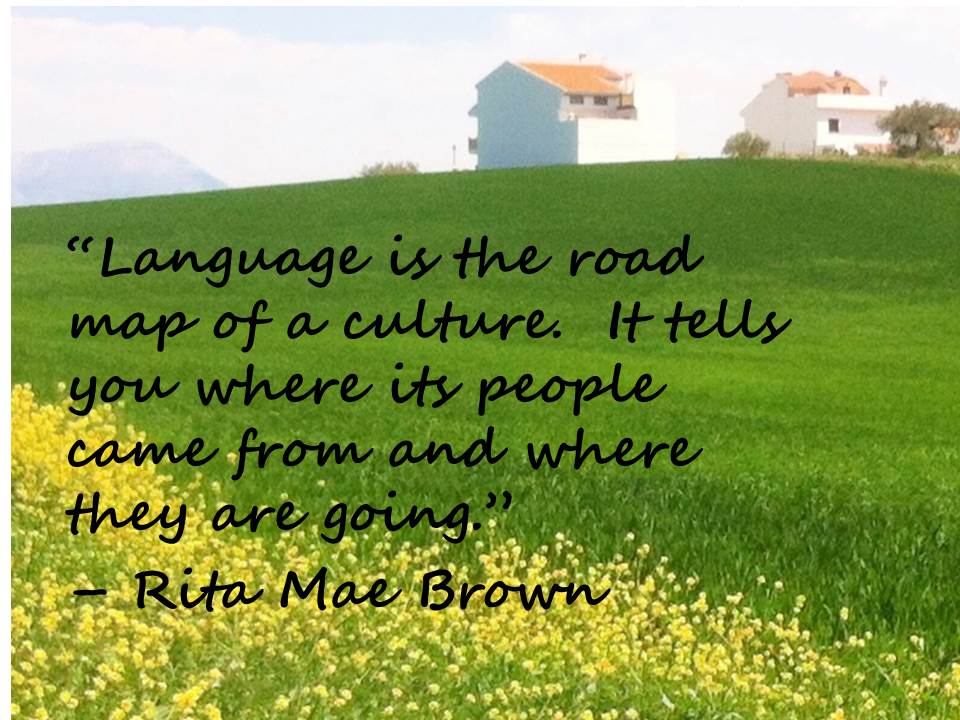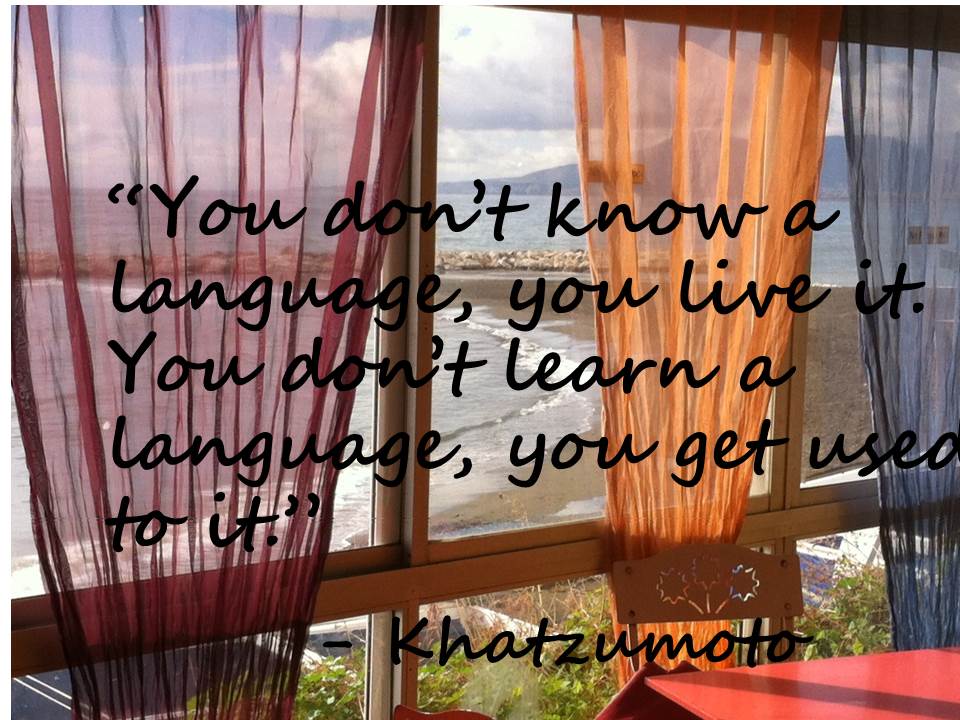Of course it's quite fun at first, isn't it? Being "the foreigner", having a bit of a laugh with neighbours about one's bad Spanish, apologising all the time, and realising that the sentence you can speak most fluently is "I'm sorry I don't understand." But there comes a point when that simply isn't good enough.
For me that tipping point came about a year ago when it occurred to me that although I got on well with my neighbours and we'd chat outside our doors long into the night on chairs perched precariously on our steep lane, they couldn't possibly know ME, the inside of me, the thoughts and experiences that have shaped me, the political principles that shape my actions. And, similarly, I couldn't possibly understand them in that way either. We got along fine, shared food and chats, borrowed and loaned cables and ladders, yet what interested each of us about the other was the foreign-ness, the differences. We regarded each other almost as specimens to be studied, with a degree of detachment.
And then there comes a point at which you need to communicate better. More deeply. As you get closer to friends and neighbours it becomes essential that they understand who you are, and that you in turn understand who they  are. If not, they cannot really be called friends. In your country of origin, your FRIENDS are those who know your background, who know your sorrows and your delights, your achievements and your pain. They know what is important to you - what are the things for which you would stick your head above the parapet, what you would take to the streets over, and for what fundamental principle you would perhaps risk arrest. In your country of origin, people who do not know those things about you are acquaintances, casual friendships, not friends. In your country of origin, you mostly develop close friendships with people who share a not too dissimilar outlook on the things you consider important, whether those be the welfare state, wars around the world, bringing up children, views on the monarchy, immigration, or animal rights.
are. If not, they cannot really be called friends. In your country of origin, your FRIENDS are those who know your background, who know your sorrows and your delights, your achievements and your pain. They know what is important to you - what are the things for which you would stick your head above the parapet, what you would take to the streets over, and for what fundamental principle you would perhaps risk arrest. In your country of origin, people who do not know those things about you are acquaintances, casual friendships, not friends. In your country of origin, you mostly develop close friendships with people who share a not too dissimilar outlook on the things you consider important, whether those be the welfare state, wars around the world, bringing up children, views on the monarchy, immigration, or animal rights.
So why would we accept any less in the relationships we build in a new home country? Clearly, to make "friends" without knowing people properly, or to call every acquaintance a friend, would be invidious. Moving to Spain is about more than sipping sangria by the pool, pleasant though that may be! Once we begin to "bed in", real communication becomes essential.

At the same time, we can begin to discover the beautiful richness of the Spanish language. In our own language, we choose our words carefully, we use light and shade, we hint at hidden meanings, we play games with words, and we recognise that what we know about a person influences how we hear and interpret the words they choose. That's complex stuff, learned through a lifetime of using the language, and through a lifetime of interpreting body-language against (usually) a shared context of background, education and environment.
Of course, learning a new language as an adult does not leave sufficient time to spend another entire lifetime understanding those nuances, nor to understand instinctively how a different background, education and environment shapes people. But we can do our best. Any relationship worth developing needs a level of understanding which can only be communicated through language.
There's a huge amount left to learn. Annoyingly, I still sometimes get mixed up between "ser" and "estar". There are common phrases that completely stump me and send me running to Jose or Adolfo for an explanation. And neighbours or workmen often have to repeat something for me. I have further layers of problems distinguishing when my Cuban, Venezuelan and Argentinian friends are using words or phrases specific to their countries.
But now I know the views and the worries of my friends and neighbours. One friend has fascinatingly complex views on the Spanish monarchy and almost contradictory thoughts about her own relationship with the church. Another  friend is passionate about an emerging left-wing political party here in Spain and we enjoy deep discussions about next year's elections here and about the forthcoming referendum in Catalunya. One "friend" was relegated somewhat, as our political differences emerged and became uncomfortable. I have a friend with whom I can (and do) talk about anything, however personal or controversial. With another, we wrestle with the complexities of human relationships. Most fun of all is learning to play with the language, use some of its richness, and to develop the ability to be me and to show my true self.
friend is passionate about an emerging left-wing political party here in Spain and we enjoy deep discussions about next year's elections here and about the forthcoming referendum in Catalunya. One "friend" was relegated somewhat, as our political differences emerged and became uncomfortable. I have a friend with whom I can (and do) talk about anything, however personal or controversial. With another, we wrestle with the complexities of human relationships. Most fun of all is learning to play with the language, use some of its richness, and to develop the ability to be me and to show my true self.
The knock-backs still come, of course - frequently. Last night at the opening concert of Colmenar's feria I was chatting with one of my neighbours, someone I have always struggled to understand well. He slurs his speech at the best of times, and propping up the bar until 3am had done nothing to make him clearer! At one point I had to get him to repeat himself four times before the penny dropped. Communication, but faltering.
But most of the time, at last I can understand my friends and neighbours as the deep, complex, rounded human-beings that they are, not merely as "amusing Spanish neighbours with their quirky ways". And at last I can be confident that if people like me or want to spend time with me, it is because they know the real me. Playing the jolly foreigner, smiling and laughing and missing the point, is alright for a while, but it's not a mantle I would want to wear for long.
© Tamara Essex 2014 www.twocampos.com
THIS WEEK'S LANGUAGE POINT:
When is a female not a female? A sticky question in Spanish. The answer is .... When you give something to her! Or say something to her.
I saw her - La vi.
I gave her a present - Le di un regalo.
I told her what time it would start - Le dije a que hora lo comenzaría.
So she remains a female person (la) when we do something direct such as seeing her (she is the "direct object pronoun", if you like the grammatical terms!). But she becomes neutral (le) when we do something TO her such as giving something to her, telling her something, or buying something for her (she is the indirect object pronoun).
It helps to remember that if you say "to her" then she becomes "le", but we sometimes miss it out, as in telling her something (though technically we are telling it TO her).
Oh and then of course it can be necessary to clarify to whom you gave the present, so we have to add "A ella le di el regalo."